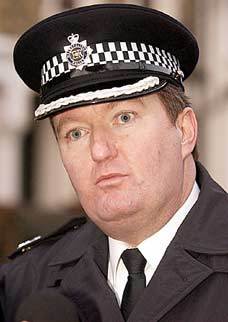 Every Christmas time, a turkey emerges to be hunted in the festive news vacuum. From Tim Yeo to Charlie Whelan, many have found themselves with the misfortune to have done something wrong when nothing else is happening – so will be pilloried from here to Hogmanay. This season it’s Bob Quick who is being stuffed, and rightly so. David Davis and David Cameron are both basting him, prior to the festive roasting. He’s issued an “unreserved apology” – but, as he’ll know, it goes far beyond that.
Every Christmas time, a turkey emerges to be hunted in the festive news vacuum. From Tim Yeo to Charlie Whelan, many have found themselves with the misfortune to have done something wrong when nothing else is happening – so will be pilloried from here to Hogmanay. This season it’s Bob Quick who is being stuffed, and rightly so. David Davis and David Cameron are both basting him, prior to the festive roasting. He’s issued an “unreserved apology” – but, as he’ll know, it goes far beyond that.
It’s a bit rich to complain about the politicisation of the police service and then describe then entire Conservative party as “corrupt”. Quick’s problem is that this cannot be dismissed as a slip of the tongue. A legitimate view, one may argue, but if it’s not political then I don’t know what is. It makes you wonder: is this the view in the upper echelons of the Met?
I suspect this reflects less a party politcial bias and more a deeper, institutional hostility to Boris Johnson deciding to take his seat as chair of the Metropolitan Police Authority and start to stir things up. If this is what the Old Bill dislike, they’d better get used to it – because the days where the police owed their allegiance to the Home Office and not the general public may soon be over. When powers of patronage are held by the Home Secretary, the promotion game is so much easier: you just implement whatever insane agenda comes from Westminster, send everyone on equality training courses, arrest whoever the Home Office want you to and wait for the extra strip on your lapel. Boris represents a new and (for the police) menacing trend. Police chiefs being elected by the general public mean the power of patronage shifts to a new, harder to please selectorate. It means you can only get on if the people you police feel happy. You have to kowtow to the people whose burglaries you refuse to investigate. Imagine!
Quick’s remarks remind me of Dick Tuck’s 1966 concession speech: “The people have spoken – the bastards”. The bastards will be doing a lot more speaking if the Tories win the next general election – and electing police chiefs up and down the country. Many of these will implement agenda that Tory Home Secretaries will hate, but that’s the price of localism.
I leave you with the case brilliantly made by Dan Hannan and Douglas Carswell in our cover piece a couple weeks ago:
“In the aftermath of the raid on Parliament Andy Hayman, who was until recently the senior anti-terrorist officer at the Met, wrote a furious article in the Times. What bothered him was not the crassness of the incursion itself, but the presumption of Boris Johnson in opposing it. ‘The police are increasingly agitated about how the political class — in particular the Mayor of London — has handled the Damian Green affair,’ he complained. I mean, who do these elected representatives think they are? Boris may have the third largest personal mandate in Europe, but his belief that this entitles him to represent his voters is, avers Hayman, ‘nothing less than political interference in operational policing’. If so, let’s have more of it. Boris is one of the few figures to emerge from the wretched business with credit.”







Comments